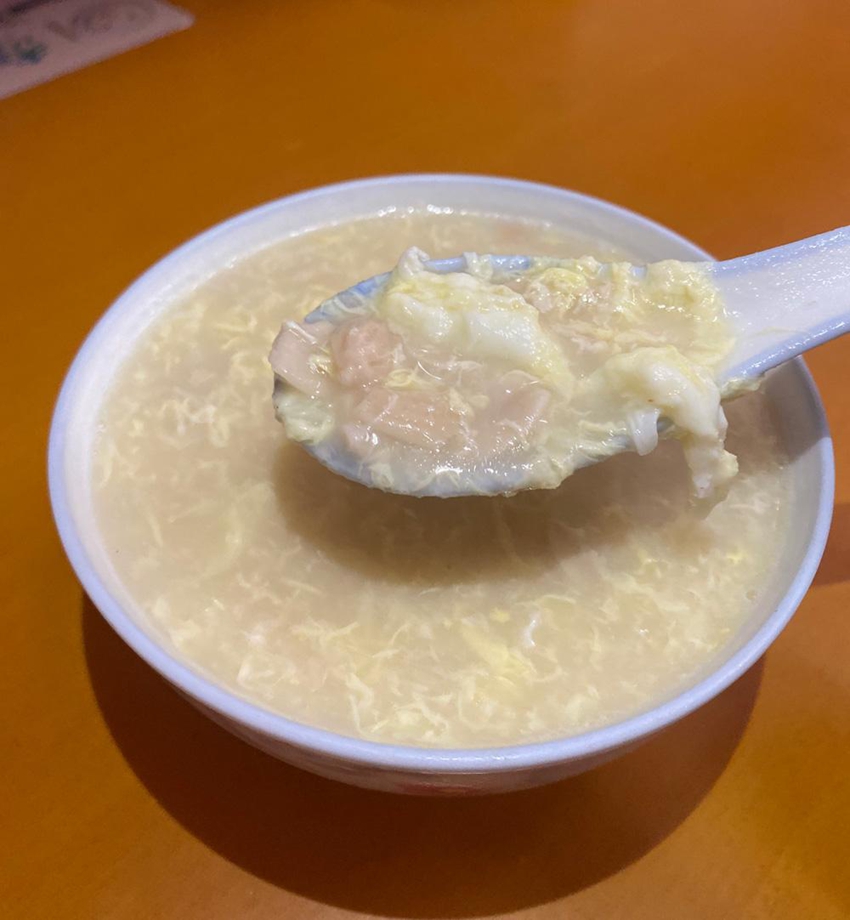- Guide
- Flavors

Peanut soup stands out for its tender, crumbled peanuts and rich, creamy broth. Paired with a soft egg, it offers layered textures—sweet yet never cloying.
(Text and photos by Xu Yaling)
Before dawn breaks over Jinjiang's Nanshan district, a faint aroma of roasted peanuts drifts through the mist. Follow it, and you'll find a queue forming outside a modest twelve-square-metre shop called Zhen Weidao Eatery. Inside, my uncle stands by the stove, ladling creamy, milk-coloured peanut soup into ceramic bowls. Golden ribbons of egg swirl across the surface as a regular calls out, "Boss, the usual—peanut soup with an egg!"
This humble dish has soothed Jinjiang residents for generations. Guided by the old saying, "Thirty per cent ingredients, seventy per cent heat," my uncle still cooks the way his elders did—slowly, patiently, without shortcuts. The key is the Xiaoliuqiu peanut, a small local variety prized for its natural sweetness and buttery texture. Years ago, before pre-shelled peanuts were sold, my uncle and aunt would spend their evenings shelling sacks of them by hand, fingertips rubbed red yet unwilling to waste a single imperfect nut. Even today, he insists on handpicking: "Only the best peanuts make that silken texture—no compromises."
By two or three in the morning, while most of the city sleeps, the couple are already up tending the fire. Water fills the cauldron, peanuts are dropped in, and a steady flame does the rest. The heat must be just right—too fierce and the nuts dissolve into paste; too low and they never reach that perfect softness. After hours of gentle simmering, crushed rock sugar is sprinkled in, its mild sweetness blending seamlessly with the nutty aroma that soon fills the street.
By five o'clock, the shutters lift. Steamers hiss, chatter fills the air, and the scent of peanut soup drifts down the lane. Regulars come and go, calling out, "Add an egg!" My uncle pours whisked egg into the pot, watching it bloom into delicate golden threads that mingle with the peanuts—each spoonful a comforting balance of smooth, warm, and sweet.
As a child, I often sat quietly in the corner, watching him move with rhythmic precision—ladling, stirring, serving—sweat tracing lines down his temples. He still sells around 400 bowls a day, more in winter. "That warmth," he says with a grin, "travels from the tongue straight to the heart."
In Quanzhou, peanut soup is far more than a dessert. It's the taste of home, a cultural symbol woven into the fabric of everyday life. Locals start groggy mornings with a bowl paired with fried vegetable cakes, its sweet-savoury mix waking both body and spirit. During Lunar New Year banquets or wedding feasts, it's served as the closing sweet soup, a symbol of happiness, harmony, and longevity. For overseas Quanzhou natives, returning home often means heading straight to these humble corner shops before anything else. As one returning visitor once said, "After decades abroad, this is the taste I miss most—more comforting than any delicacy."
Quanzhou's peanut soup also tells a story of cultural exchange. Its balanced sweetness—milder than northern sweet soups, richer than Guangdong's sugar waters—reflects the city's gentle temperament: reserved yet warm, refined yet inclusive. Historians trace its roots back to the Ming and Qing dynasties, when Arab merchants settled in Quanzhou, bringing sugar-making techniques that blended seamlessly with local peanut-cooking traditions.
A single bowl holds more than flavour—it carries memory, history, and affection. Amid Quanzhou's evolving skyline of glass towers and ancient courtyards, that familiar sweetness remains unchanged. It lingers like an old song, reminding every returning traveller that some comforts, like the warmth of a morning bowl of peanut soup, are timeless.
